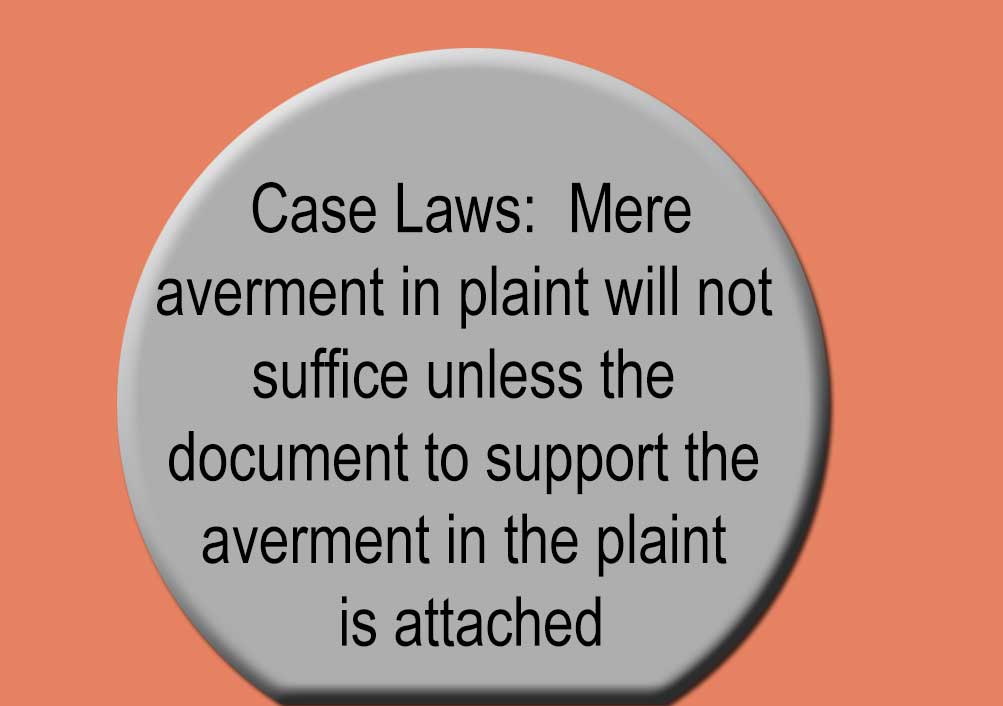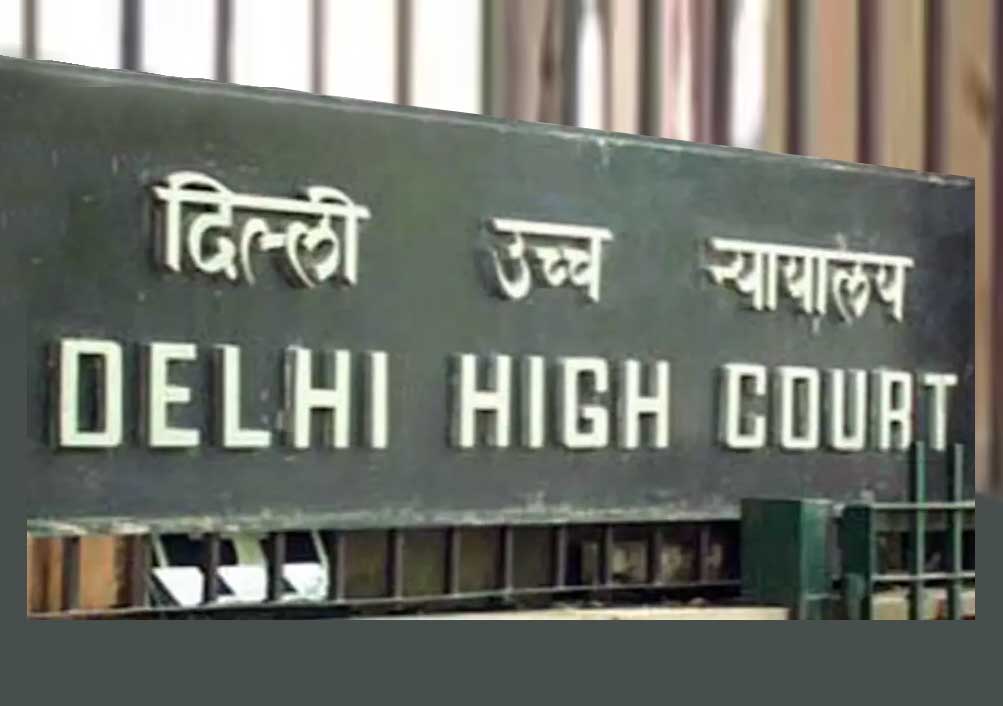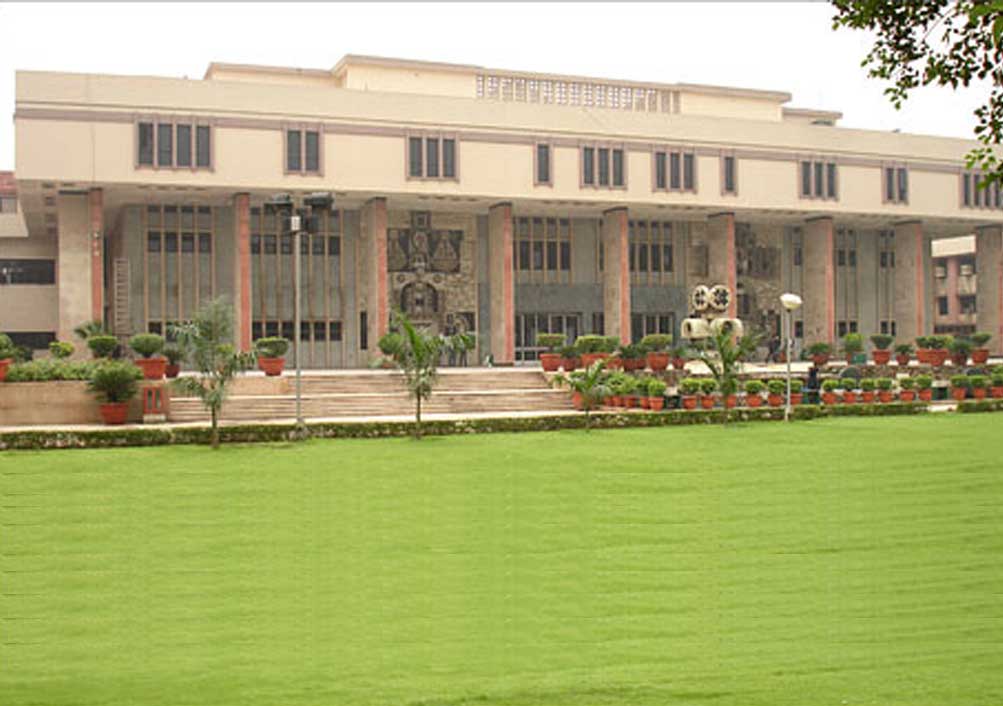Case Laws: Mere averment in plaint will not suffice unless the document to support of the averment in the plaint is attached.

Order VII Rule 14(1) Code of Civil Procedure provides for production of documents, on which the plaintiff places reliance in his suit, which reads as under :
14: Production of document on which plaintiff sues or relies.– (1) Where a plaintiff sues upon a document or relies upon document in his possession or power in support of his claim, he shall enter such documents in a list, and shall produce it in Court when the plaint is presented by him and shall, at the same time deliver the document and a copy thereof, to be filed with the plaint.
(2) Where any such document is not in the possession or power of the plaintiff, he shall, wherever possible, state in whose possession or power it is.
(3) A document which ought to be produced in Court by the plaintiff when the plaint is presented, or to be entered in the list to be added or annexed to the plaint but is not produced or entered accordingly, shall not, without the leave of the Court, be received in evidence on his behalf at the hearing of the suit.
(4) Nothing in this rule shall apply to document produced for the cross examination of the plaintiff’s witnesses, or, handed over to a witness merely to refresh his memory.”
I. Maria Margadia Sequeria Fernandes v. Erasmo Jack De Sequeria (D) Tr.Lrs
Supreme Court of India | 21-03-2012
In the said case, the Supreme Court highlighted that suspicious pleadings, incomplete pleadings and pleadings not supported by documents would not even warrant issues to be settled by making following observation:-
71. Apart from these pleadings, the Court must insist on documentary proof in support of the pleadings. All those documents would be relevant which come into existence after the transfer of title or possession or the encumbrance as is claimed. While dealing with the civil suits, at the threshold, the Court must carefully and critically examine pleadings and documents.
72. The Court will examine the pleadings for specificity as also the supporting material for sufficiency and then pass appropriate orders.
73. Discovery and production of documents and answers to interrogatories, together with an approach of considering what in ordinary course of human affairs is more likely to have been the probability, will prevent many a false claims or defences from sailing beyond the stage for issues.
74. If the pleadings do not give sufficient details, they will not raise an issue, and the Court can reject the claim or pass a decree on admission.
75. On vague pleadings, no issue arises. Only when he so establishes, does the question of framing an issue arise. Framing of issues is an extremely important stage in a civil trial. Judges are expected to carefully examine the pleadings and documents before framing of issues in a given case.
II. Sagar Gambhir v. Sukhdev Singh Gambhir (Since Deceased) Thr His Legal Heirs & Another
(High Court Of Delhi) | 06-03-2017
In the said case, the Delhi High court highlighted the vague assertion of the appellant in the pleadings and by referring P.K. Gupta vs Ess Aar Universal (P) Ltd in which it has been stated “11. We need to highlight that the fundamental principles, essential to the purpose of a pleading is to place before a Court the case of a party with a warranty of truth to bind the party and inform the other party of the case it has to meet. It means that the necessary facts to support a particular cause of action or a defence should be clearly delineated with a clear articulation of the relief sought. It is the duty of a party presenting a pleading to place all material facts and make reference to the material documents, relevant for purposes of fair adjudication, to enable the Court to conveniently adjudicate the matter. The duty of candour approximates uberrima fides when a pleading, duly verified, is presented to a Court. In this context it may be highlighted that deception may arise equally from silence as to a material fact, akin to a direct lies. Placing all relevant facts in a civil litigation cannot be reduced to a game of hide and seek.” held that in the plaint the lack of pleadings to said effect cannot be overlooked. There is thus a bald assertion without any material particulars regarding the firm M/s Gian Singh Sukhdev Singh being set up by the great grandfather of the appellant on which present appellant claims his share.
III. Victor Fernandes & Others v. Raghav Bahl of Noida & Others
(High Court Of Judicature At Bombay) | 21-09-2011
In this case Bombay High court made the following observation:-
“4. We have gone through the pleadings and the documents on record and heard the respective submissions of the learned Senior Counsel appearing for the parties. Mere allegations of fraud or conspiracy or misrepresentation are not sufficient. Apart from above prayer clauses, the basic averments with regard to the allegations though made in paragraph 11 but there are no particulars/ materials /details provided. Mere allegations and/or averments are not sufficient to grant any interim or ad-interim relief, as sought, in the present case, by the Plaintiffs. The alleged defaults, misrepresentations and/or loss or damages caused to the company if any, need to be stated in a clear terms with supporting documents and the particulars. The vague allegations or averments made in the Petition, therefore, in our view, cannot be a basis to grant interim relief as sought in the present matter at this stage.”
https://www.legitquest.com/case/victor-fernandes–others-v-raghav-bahl-of-noida–others/7534B
IV. Wallace Pharmaceuticals Pvt. Ltd v. m.v. Bunga Bidara & Others
(High Court Of Judicature At Bombay) | 27-09-2013
In this case Bombay High court stated that In the matter of an admiralty action to arrest a ship, it cannot be mere averments that would support the action. It must be supported by documentary evidence to show that the goods were in fact shipped to maintain action against the vessel and made the following observation-
“24 When a ship is arrested the owners are put to immense pressure and loss. It is not only the owners but even those whose cargo are on board the vessel suffer. Any attempt of parties to cleverly draft the plaint and create an illusion of the cause of action and obtain orders of arrest of vessel to pressurize owners to settle the matter should be nipped in the bud. Some owners may succumb to the pressure, particularly in view of the fact that cost of litigation is very high today. It will save lot of time of the Courts if fraudulent and frivolous litigations are not entertained. A meaningful reading of the Plaint shows that the basis of the Plaintiffs allegation against Defendant Nos.1 and 2 are based on documents. But no document has been produced or presented or entered in any list to show there was a contract between the plaintiff and Defendant no.2 or that the consignment was loaded on defendant no.1-vessel or carried by defendant no.2. The single Judge and the Division Bench has conclusively held that the plaintiff has failed to so establish. This is not a case where admittedly the vessel has carried the cargo but the Plaintiff has not been able to establish his prima-facie title to sue or establish the value of his claim and the security is ordered to be reduced or returned. The Single Judge and the Division Bench have in no uncertain terms held that the Plaintiff has failed to establish any link with Defendant Nos.1 and 2. In such circumstances, just because the plaintiff has alleged that they have a cause of action by narrating facts without any basis, and which has so been held by the single Judge and the Division Bench, it will be unfair to make the defendant nos.1 & 2 to go through the entire trial by incurring costs. It would also save valuable time of this Court.”
https://www.legitquest.com/case/wallace-pharmaceuticals-pvt-ltd-v-mv-bunga-bidara–others/8025C
CONCLUSION
From the above discussions and decisions the following points emerge:
The pleadings must contain something more than a statement of facts that merely creates a suspicion of a legally cognizable right of action and recitals of the elements of a cause of action, supported by mere conclusory statements, do not suffice. Same can be inferred from Order VII Rule 14(1) as well that when a plaintiff sues upon a document or relies upon document in his possession or power in support of his claim, he shall enter such documents in a list, and shall produce it in Court.
Sign up for our weekly newsletter to stay up to date on our product, events featured blog, special offer and all of the exciting things that take place here at Legitquest.




Add a Comment